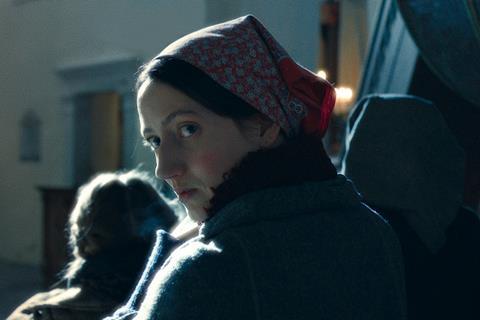Maura Delpero’s second feature is an accomplished, restrained family drama set in the Italian Alps during the Second World War

Dir/scr: Maura Delpero. Italy/France/Belgium. 2024. 119mins
Italian family saga Vermiglio is set in the titular Alpine village at the tail end of the Second World War. Director Maura Delpero (Maternal), whose father was Vermiglio’s sole school teacher, looks at this isolated community, each member of which has their own desires and growing pains. Beautifully shot, played by a mix of professional actors and locals and spoken mostly in dialect, Vermiglio feels both authentic and almost restrained to a fault.
Authentic and almost restrained to a fault
Yet there’s no denying the filmmaking prowess of Delpero, who here works on a craft level that will lead to comparisons to the oeuvre of Alice Rohrwacher, even if Delpero works in a less expressionistic, more traditional vein. Arthouse prospects look decent and festival interest is a given; Vermiglio will next play Toronto and will also be in competition in London.
High up in the Alps in the middle of winter, there isn’t much of a sense that the Second World War is actually ongoing at all. That is, until the unexpected arrival of Pietro (Giuseppe De Domenico), a Sicilian soldier who has deserted the front. Most of the villagers are comfortable with the presence of the cowardly but handsome young man among them thanks to the influence of local teacher Cesare Graziadei (Tommaso Ragno), who suggests that no soldier asked for the war. Pietro is also helped by the fact that he brought back fellow soldier Atillio (Santiago Fondevila Sancet), one of the village sons who basically owes his life to Pietro.
While Pietro keeps mostly to himself in one of the stables, it is obvious that Cesare’s eldest daughter, Lucia (Martina Scrinzi, a real find), has taken an amorous interest. Their courtship plays out largely without words, though the chemistry of De Domenico and Scrinzi sells the love-at-first-sight sentiment even without the use of closeups.
More generally speaking, Delpero often prioritises images over words, ensuring the cinematic bona fides of her second fiction feature but also keeping her protagonists somewhat removed from the audience. A lot of the emotions are not talked about but, even when they are shown, they are often restrained. And without further access to the characters’ feelings, this means that the overall emotional temperature of the narrative doesn’t fluctuate all that much.
Delpero, who also wrote the screenplay, initially looks at the entire Graziadei clan, which also includes Lucia’s mother, younger sisters and brothers. But the film slowly narrows its perspective to focus on Lucia’s trajectory as she faces a few unexpected revelations. While she’s meant to grow into a paragon of a modern, postwar woman so different from the generations imprisoned by antiquated ideas of womanhood before and during the war, the film is perhaps a tad too subtle here too. A more obvious contrast with the fate of the other female members of her family might have helped to better underline the momentous transformation of at least one of them.
Russian cinematographer Mikhail Krichman, famous for his beautifully modulated work with Andrey Zvyagintsev (The Banishment, Elena), brings his usual expertise to the table and the result is a gorgeously stilted world full of secrets and shadows occasionally pierced by milky white light. The production and costume design are also both beautifully done as well, without forgetting that the Graziadei family lives in what is essentially a kind of poverty that suggests that high up in the mountains, it’s not only not yet the 1940s but, in some ways, not even the 20th century.
Production companies: Cinedora, Rai Cinema, Charades Productions, Versus Production
International sales: Charades sales@charades.eu
Producers: Francesca Andreoli, Leonardo Guerra Seràgnoli, Maura Delpero, Santiago Fondevila Sancet
Cinematography: Mikhail Krichman
Production design: Pirra, Vito Giuseppe Zito, Marina Pozanco
Editing: Luca Mattei
Music: Matteo Franceschini
Main cast: Tommaso Ragno, Giuseppe De Domenico, Roberta Rovelli, Martina Scrinzi, Orietta Notari, Carlotta Gamba, Santiago Fondevila Sancet, Rachele Potrich, Anna Thaler, Patrick Gardner
























